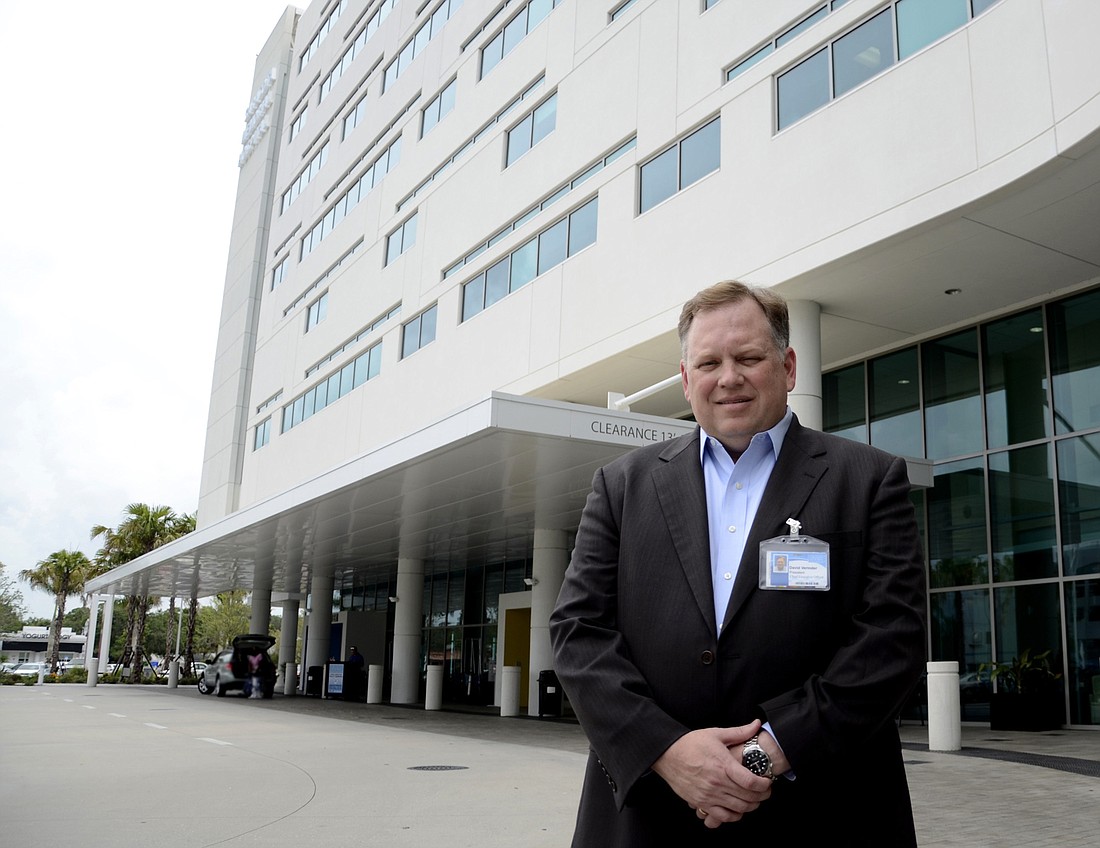- April 19, 2024
-
-
Loading

Loading

The Sarasota County Public Hospital Board on Tuesday with an 8-1 vote approved several provisions of president and CEO David Verinder’s eight-year contract extension, despite some board members' concerns that a 10-year total contract would hobble future boards.
Verinder has worked for Sarasota Memorial Hospital for 15 years and has been president and CEO since 2014 after former CEO Gwen MacKenzie stepped down.
The hospital board in December voted 8-1 to extend his current two-year contract another eight years, contingent on details confirmed at Tuesday’s meeting. His contract otherwise would expire Dec. 31, 2022, but now his new term will expire Dec. 31, 2031.
During a governance effectiveness committee meeting Tuesday, board member Tramm Hudson — who cast the dissenting vote — and Board Chair James Meister expressed concern over the 10-year contract. They were in favor of a contract renewal, but one of a shorter length.
“Other than the director of the FBI, I do not know of any other government official that has a 10-year contract,” Hudson said. “The Tampa Bay Buccaneers only gave Tom Brady a two-year contract.”
Because Meister originally voted in favor of the eight-year extension during December’s meeting, he could have reopened the discussion and vote on the extension length during the regular board meeting. However, he chose not to.
“The consensus of the board based on the December vote was that there’s nothing inappropriate to a 10-year contract,” Meister said. “So if that decision was made and the board is not willing to rethink it, why raise it?”
In addition to the lengthened contract, the board also granted Verinder a salary increase from $1,045,000 in 2020 to $1,125,000 in 2021, or a 7.1% increase. Verinder’s performance is reviewed annually and each December the board determines his salary for the following year.
SMH public relations manager Kim Savage said the increase shifted Verinder from the 65th percentile of CEOs serving in comparable roles to the 75th percentile.
During Tuesday’s meeting, board members discussed and approved several terms of Verinder’s new contract including clauses for early termination, expanded cause provisions and non-compete waivers.
The new contract includes an early termination agreement that outlines procedures for termination with and without cause. The new contract has tighter stipulations for without-cause termination, which hospital attorney Kim Walker said is typical.
For the board to terminate the contract with cause, it must have a two-thirds vote before giving Verinder an opportunity to cure the performance. If performance is not better after the opportunity to cure, the board can terminate the contract with 120 days' notice.
Severance pay depends on how long Verinder has remaining in his contract at the time of termination. Verinder may resign at any time with 120 days' notice without contractual damages, though he would forfeit unvested retirement, SMART compensation and long-term incentives.
Although they approved most of the contract’s provisions, board members could not agree on a provision related to consultive services after Verinder’s contract is finished.
The contract as proposed would have retained Verinder as a consultant for 24 months upon completion of his term. In lieu of severance pay, Verinder would be an exclusive consultant to SMH for an annual fee of 20% of his final annual base salary plus full-time employee health care benefits.
However, several board members opposed both the length of the proposed consultancy and the amount paid to Verinder.
“When you think about 10 years from now, what his salary could be, just assume the 3% [raise] a year we normally give,” Hudson said. “This could easily be as much as $500,000 a year, and in my experience, they rarely get a phone call to come in.”
Board members Sarah Lodge and Richard Rehmeyer expressed similar concerns, stating Verinder could be making several million annually by the end of his contract so the board could be on the hook for a large payout for consulting services in future.
Board member Britt Riner said that she thinks the consulting agreement is too long, but most hospitals would pay any price to keep a successful CEO on as a consultant and protect SMH’s institutional knowledge as long as it’s able.
“The hospital is doing well, and clearly, we can attribute that to great leadership,” Riner said. “I would imagine any other healthcare system in our area would be delighted to pay any price that they could to acquire our CEO for knowledge and trade secrets.”
Lisa Dietrich, a principal and senior compensation and benefits consultant for Mercer, said it’s not uncommon to have a transition period from one CEO to the next, but they typically last 12 months or less. However, she said the 20% salary was commensurate with the market rate.
In the end, board members agreed to set aside the consulting services provision for future discussion and approve all other provisions of his contract.
At the end of the discussion, Verinder thanked the board for its feedback and said he is looking forward to the next several years of service.
“I feel very privileged to come to work every day and work for and serve this community and this hospital system,” Verinder said. “Thank you for allowing me to continue to do that.”